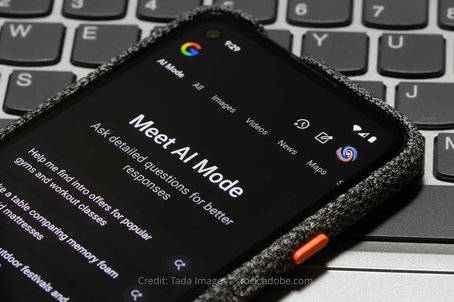AI-Ready SEO: Why Preparing Your Website for the Future Starts Now

Search engine optimisation (SEO) has always adapted to new technology and changing user behaviour. But artificial intelligence (AI) is creating the biggest shift yet, changing how people search, how search engines interpret content, and how organisations must respond.
For charities and ethical organisations, staying visible online means preparing for this shift now. Here we answer key questions about how AI is transforming search and what practical steps your website can take to stay ahead.
How Is AI Changing the Way People Search?
Until recently, most online searches followed a predictable pattern: users typed keywords, browsed results, and clicked links. Now, AI-powered tools, such as Google Gemini, Microsoft Copilot, Perplexity, and ChatGPT are changing that behaviour.
Key changes in search behaviour:
1. Conversational and natural language search
People now type queries the same way they speak: “What’s the best way to reduce my carbon footprint?” instead of simply “carbon footprint reduction tips.” AI-powered search engines are built to interpret these nuanced, context-rich queries.
2. Context and intent over keywords
AI algorithms focus on why a person is searching, not just what they type. For charities, this means someone asking “How can I help with homelessness in London?” might be served results including volunteering opportunities, donation pages, or educational content, even if those exact phrases weren’t used.
3. Answer-first results and reduced clicks
Many AI tools summarise answers on the results page itself (known as “zero-click search”), so people may get the information they need without visiting your site. Your content must be optimised for these AI-driven summaries to remain visible.
What Are the Key SEO Trends in the AI Era?
Adapting to these shifts requires a new approach to SEO. While traditional fundamentals like technical SEO and content quality remain critical, new trends are emerging:
1. Answer Engine Optimisation (AEO)
Search engines and AI assistants are focused on delivering immediate answers to questions. Websites that provide clear, concise, and structured answers to common questions are more likely to be featured.
Example: A charity focused on mental health might create content answering “What are the signs of anxiety in teenagers?” in a succinct, authoritative way. Structured data (like FAQ schema) can help this content be pulled directly into search results or AI-generated summaries.
2. Generative Engine Optimisation (GEO)
Generative AI doesn’t just show existing links, it synthesises content. Websites need to establish themselves as credible and authoritative so that AI-driven tools trust and reference their content.
Example: If your charity provides climate data, ensuring it is accurate, up-to-date, and well-referenced increases the chance of it being cited by AI tools when people search for “UK climate change charity statistics.”
3. Semantic Search and E-E-A-T
Google and other search engines increasingly prioritise Experience, Expertise, Authoritativeness, and Trustworthiness (E-E-A-T). This is especially important in sectors like health, education, and social impact.
Example: A health-focused charity publishing articles written or reviewed by qualified professionals and including author bios, citations, and references is more likely to rank and be trusted by AI algorithms.
What Does an “AI-Ready” Website Look Like?
An AI-ready website is optimised for both traditional search enginers and AI-powered discovery systems. It is technically sound, rich in trustworthy content, and structured in a way that enables AI tools to understand and use it effectively.
1. Technical SEO Foundations
Fast page speeds, mobile-first design, and secure HTTPS connections remain critical. Sites failing on technical SEO risk being deprioritised by AI-powered algorithms .
2. Structured Data and Schema Markup
Schema markup (like FAQ, Event, or Article schema) helps search engines and AI models understand your content. For example, adding Event Schema ensures your fundraising event dates, times, and locations can be directly displayed in search results .
3. Content Designed for People and AI
Your content must answer real questions clearly while being easily parsed by AI systems:
- Use question-based headings (H2, H3) to mirror user queries.
- Summarise key answers clearly at the start of each section.
- Include FAQs and “People Also Ask” style questions within content.
4. Accessibility and Inclusivity
AI-driven search increasingly values user experience, including accessibility. A website that meets accessibility standards (e.g., WCAG 2.1) not only serves more users but also signals quality and inclusivity to search engines.
Why Does This Matter for Charities and Ethical Organisations
For charities, being visible in search results is often a primary route to engaging supporters, raising awareness, and delivering sevices. In an AI-driven search landscape:
Donor journeys are changing
A potential donor might ask an AI assistant “Which charities have the best impact on homelessness in London?” If your organisation’s content isn’t accessible to AI tools, you risk missing out on that visibility.
Competition is increasing
AI-driven summaries often reference fewer sources. Being recognised as a trusted authority could mean being one of the few organisations mentioned, rather than one of many listed on page two of Google.
Reputation is built on trust
If AI incorrectly summarises your cause (or worse, doesn’t reference you at all) public understanding and trust could be affected.
What Steps Should You Take to Make Your Website AI-Ready?
Step 1: Conduct an AI-SEO Audit
Evaluate how well your website is currently optimised for both traditional SEO and AI readiness. This should include:
- Reviewing technical SEO and site speed.
- Checking schema markup implementation.
- Analysing content structure and question-focused sections.
Step 2: Refresh Your Content Strategy
- Map key supporter questions and create content to answer them directly.
- Add structured FAQ sections for common search intents.
- Optimise pages for natural language queries, not just keywords.
Step 3: Establish Authority and Trust
- Include author bios and credentials for all expert content.
- Reference reputable external sources and ensure your content is up to date.
- Build high-quality backlinks through collaborations and media mentions.
Step 4: Embrace Accessibility and UX
- Audit your website for accessibility compliance (e.g. WCAG 2.1).
- Simplify navigation and ensure content is easy to find and digest.
- Make sure forms, donation pages, and interactive features work seamlessly across devices.
Where Is AI Search Heading Next?
AI in search is still evolving, but the direction is clear: voice search, conversational interfaces, and generative AI are becoming mainstream. Charities that act now will be better prepared as these technologies mature.
Voice search
With smart speakers and mobile assistants, optimising for voice queries (often question-based and local) will be increasingly important.
Personalised results
AI personalisation means your content strategy must account for different audience segments, from donors to service users.
Cross-platform presence
Beyond Google, consider visibility on AI-driven platforms like ChatGPT Plugins or Perplexity search.
Future-Proofing Your Digital Presence
AI is reshaping SEO at a fundamental level. For charities and ethical organisations, this change is an opportunity to improve discoverability, strengthen credibility, and better connect with supporters.
By focusing on technical SEO, structured data, accessible design, and high-quality, question-led content, your organisation can secure visibility in both today’s and tomorrow’s AI-powered search landscape.
Ready to make the most of AI?
We're supporting charities and ethical organisations get AI-ready - from SEO health checks and AI-readiness reviews, to exploring innovative uses like automation, personalisation and improved efficiency. Whether you're looking to boost visibility or unlock broader AI potential, we'd love to help.





